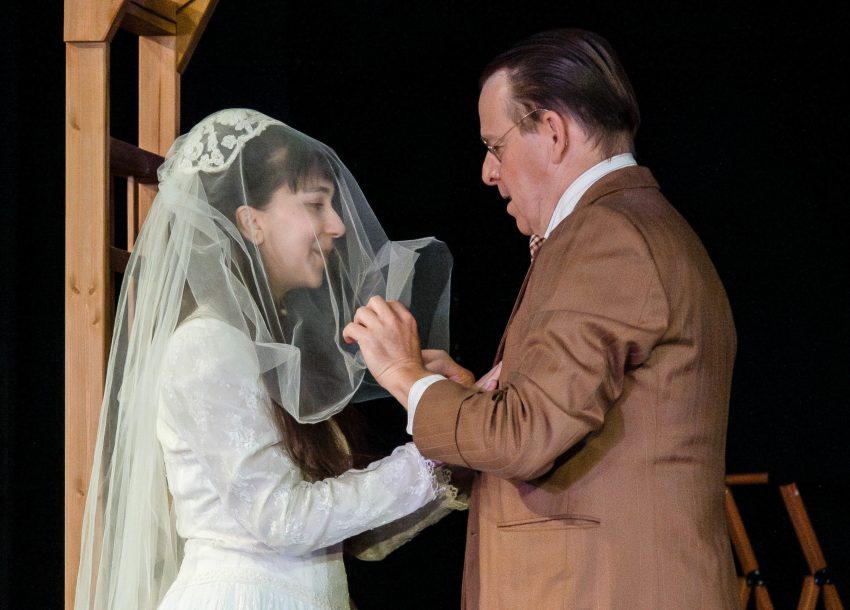
“Our Town” Wakes Us Up, Gently—at Ross Valley
Thornton Wilder Reminds Us of The Human Condition
by Lynne Stevens
In “Our Town,” a play within a play, the Stage Manager speaks directly to us, describing Grover’s Corners, a quiet New Hampshire town. With a resigned air of sadness, she recounts people’s lives between 1901 and 1913, accompanied by soft violin music.
With its Zen-like focus on consciousness, Thornton Wilder’s 1938 Pulitzer Prize-winning play was ahead of its time. In a groundbreaking new style, his Stage Manager speaks directly to the audience while the play covers 12 years. That’s enough time for the teenagers to grow up, marry, and experience the pains of life. The Stage Manager (solid Lisa Morse) points out that most of us walk through life asleep.
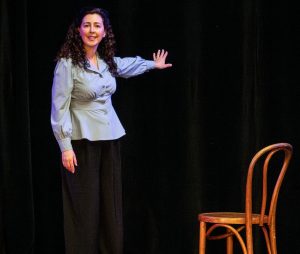
“Our Town” bursts with philosophical observations. As Morse explains, “Now there are some things we all know, but we don’t take’m out and look at’m very often. . . . There’s something way down deep that’s eternal about every human being.” Observing, the Stage Manager claims it’s a vicious circle: “You’ve got to love life to have life, and you’ve got to have life to love life.”
She tells us that Joe Crowell (Dalton Ortiz), the paperboy, earned a scholarship to MIT. But WWI broke out and Joe dies in France. She oddly exclaims, “All that education for nothing.” We hope she recognizes his sacrifice in war.
Wilder shows the Webb and Gibbs families at breakfast at their kitchen tables, recalling Norman Rockwell’s idyllic paintings. Their small talk, and gossip evoke the whole American tapestry.
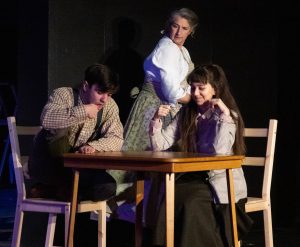
Set Designer Ronald Krempetz has adhered to the traditional spare set: a few chairs, two tables, and two ladders. The actors mime their lives—drinking coffee, throwing newspapers, delivering milk, flirting across the back fence. We can identify with these simple things.
By 1904, Emily Webb (winsome Tina Traboulsi) and George Gibbs (affable Jaedan Sanchez) are courting from their upstairs windows, like Romeo and Juliet but without the family enmity.
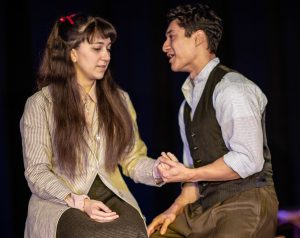
Mrs. Gibbs (wistful Lauri Smith) and Mrs. Webb (sympathetic Jennifer S. McGeorge) continue their routine “woman’s work” on the morning of their children’s wedding. Their routines echo: bring up two children apiece, cook three meals a day, wash and clean—without vacations. And never a nervous breakdown.
Mrs. Gibbs is restless with daily life, but she cannot convince Dr. Gibbs to take a holiday. She yearns to see Paris.
In Act Three, we are suddenly transported to the graveyard on a starry night. Now the Stage Manager describes who has made their way there and how. The five characters new to the graveyard make soft comments about what it is like to be there, how they have let go of the past and only look forward.
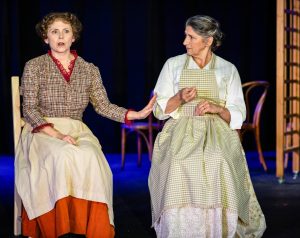
“Our Town” encourages us to enjoy life while we have it. Don’t wait for tomorrow. Enjoy each day. I’m left wishing Mrs. Gibbs had taken that trip to Paris.
An American classic, Wilder’s “Our Town” charts the march of technology, as horses give way to automobiles and home handiwork is replaced by factories. And how things do change. We must stay alert to progress.
The Ross Valley Players hit all the right notes with solid performances all around. Everyone should take in this existential experience at least once in their life.
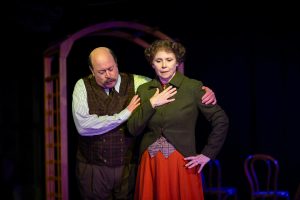
“Our Town” – by Thornton Wilder, directed by Chloe Bronzan, set design by Ronald E. Krempetz, costume design by Michael A. Berg, sound design & original music by Billie Cox, lighting design by Frank Sarubbi, at Ross Valley Players, Ross, California. Info: rossvalleyplayers.com – to February 25, 2024.
Cast: Lisa Morse, Michael-Paul Thomsett, Dalton Ortiz, Justin Hernandez, Lauri Smith, Jennifer S. McGeorge, Jaedan Sanchez, Alexandra Fry, Tina Traboulsi, Tom Reilly, Steve Price, Peter Warden, and Ann Fairlie.
Banner photo: Tina Traboulsi (Emily) & Steve Price (Mr. Webb). Photos by Robin Jackson